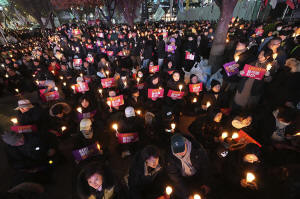South Korea’s opposition parties submit a motion to impeach President
Yoon over sudden martial law
 Send a link to a friend
Send a link to a friend
 [December 04, 2024]
By HYUNG-JIN KIM and KIM TONG-HYUNG [December 04, 2024]
By HYUNG-JIN KIM and KIM TONG-HYUNG
SEOUL, South Korea (AP) — South Korea’s opposition parties Wednesday
submitted a motion to impeach President Yoon Suk Yeol over the shocking
and short-lived martial law that drew heavily armed troops to encircle
parliament before lawmakers climbed walls to reenter the building and
unanimously voted to lift his order.
Impeaching Yoon would require the support of two-thirds of parliament,
and at least six justices of the nine-member Constitutional Court would
have to endorse it to remove him from office. The motion, submitted
jointly by the main liberal opposition Democratic Party and five smaller
opposition parties, could be put to a vote as early as Friday.
Yoon’s senior policy advisers and Defense Minster Kim Yong Hyun offered
to resign as the nation struggles to make sense of what appeared to be a
poorly-thought-out stunt. The Democratic Party on Wednesday submitted a
separate motion to impeach Kim, who it alleged recommended the martial
law declaration to Yoon.
In his speech announcing the abrupt order Tuesday night, Yoon vowed to
eliminate “anti-state” forces and continued to criticize the Democratic
Party's attempts to impeach key government officials and senior
prosecutors. But martial law lasted only about six hours, as the
National Assembly voted to overrule Yoon before his Cabinet formally
lifted it around 4:30 a.m.

The Democratic Party, which holds a majority in the 300-seat parliament,
said Wednesday that its lawmakers decided to call on Yoon to quit
immediately or they would take steps to impeach him.
“President Yoon Suk Yeol’s martial law declaration was a clear violation
of the constitution. It didn’t abide by any requirements to declare it,”
a party statement said. “His martial law declaration was originally
invalid and a grave violation of the constitution. It was a grave act of
rebellion and provides perfect grounds for his impeachment.”
What happens if Yoon is impeached?
Impeaching him would require support from 200 of the National Assembly's
300 members. The Democratic Party and other small opposition parties
together have 192 seats. But the rejection of Yoon’s martial law
declaration in a 190-0 vote included the votes of 18 lawmakers from
Yoon’s ruling People Power Party, according to National Assembly
officials. PPP leader Han Dong-hun and Seoul Mayor Oh Se-hoon, also a
member, criticized Yoon's martial law declaration.
Cho Jinman, a professor at Seoul’s Duksung Women’s University, said it’s
highly likely that lawmakers will back Yoon’s impeachment motion given
that some from the ruling party already voted down his edict.
If Yoon is impeached, he’ll be stripped of his constitutional powers
until the Constitutional Court rules. Prime Minister Han Duck-soo, the
No. 2 position in the South Korean government, would take over his
presidential responsibilities. Han issued a public message pleading for
patience and calling for Cabinet members to “fulfill your duties even
after this moment.”
The Constitutional Court has only six incumbent justices following three
retirements. That means all six must approve Yoon's possible impeachment
motion for it to succeed. They include those appointed after Yoon took
office, so the Democratic Party is expected to speed up the process of
exercising its rights to recommend two of the three new justices.
Yoon’s martial law declaration, the first of its kind in more than 40
years, harkened to South Korea’s past military-backed governments when
authorities occasionally proclaimed martial law and other decrees that
allowed them to station combat soldiers, tanks and armored vehicles on
streets or at public places like schools to prevent anti-government
demonstrations. Such scenes of military intervention had not been seen
since South Korea achieved a democracy in the late 1980s until Tuesday
night.
Dramatic hours at the parliament
After Yoon’s declaration, troops carrying full battle gear, including
assault rifles, tried to keep protesters away from the National Assembly
as military helicopters flew overhead and landed nearby. One soldier
pointed his assault rifle at a woman who was among protesters outside
the building demanding that the martial law be lifted.
[to top of second column]
|

People hold candles during a candlelight vigil against South Korean
President Yoon Suk Yeol in Seoul, South Korea, Wednesday, Dec. 4,
2024. (AP Photo/Lee Jin-man)

It wasn’t clear how the 190 lawmakers were able to enter a
parliamentary hall to vote down Yoon’s martial law decree.
Opposition leader Lee Jae-myung and National Assembly Speaker Woo
Won Shik were seen climbing over walls. As troops and police
officers blocked some from entering, they didn’t aggressively
restrain or use force against others.
No major violence has been reported. The troops and police personnel
were later seen leaving the grounds of the National Assembly after
the parliamentary vote to lift the martial law. Woo said: “Even with
our unfortunate memories of military coups, our citizens have surely
observed the events of today and saw the maturity of our military.”
Under South Korea’s constitution, the president can declare martial
law during “wartime, war-like situations or other comparable
national emergency states” that require the use of military force to
restrict the freedom of press, assembly and other rights to maintain
order. Many observers question whether South Korea is currently in
such a state.
The constitution also states that the president must oblige when the
National Assembly demands the lifting of martial law with a majority
vote.
A presidential official said that Yoon decided to impose martial law
as a way to resolve a political deadlock and did it in the middle of
night to minimize its negative impacts on the economy. The official
requested anonymity to discuss sensitive nature of the issue.
Some experts say Yoon clearly violated the constitution in how he
imposed martial law. While martial law allows “special measures” to
restrict individual freedoms and the authority of agencies and
courts, the constitution does not permit the functions of parliament
to be restricted. But in following Yoon’s declaration on Tuesday,
South Korea’s military proclaimed parliamentary activities were
suspended and deployed troops to try to block lawmakers from
entering the National Assembly.
Park Chan-dae, the Democratic Party’s floor leader, called for Yoon
to be immediately investigated on charges of rebellion over the way
he deployed troops to the parliament. While the president mostly
enjoys immunity from prosecution while in office, the protection
does not extend to alleged rebellion or treason.

In Washington, the White House said the U.S. was “seriously
concerned” by the events in Seoul. A spokesperson for the National
Security Council said President Joe Biden’s administration was not
notified in advance of the martial law announcement and was in
contact with the South Korean government.
In Seoul, the streets seemed busy like a normal day Wednesday.
Tourist Stephen Rowan, from Brisbane, Australia, who was touring
Gyeongbokgung Palace, said he was not concerned at all.
“But then again, I don’t understand too much about the political
status in Korea,” he said. “But I hear they are now calling for the
current president’s resignation, so ... apparently there’s going to
be a lot of demonstrations. ... I would have been concerned if
martial law had stayed enforced.”
Natalia Slavney, research analyst at the Stimson Center’s 38 North
website that focuses on Korean affairs, said Yoon’s imposition of
martial law was “a serious backslide of democracy” that followed a
“worrying trend of abuse” since he took office in 2022.
___
Associated Press writer Jennifer McDermott contributed to this
report.
All contents © copyright 2024 Associated Press. All rights reserved |